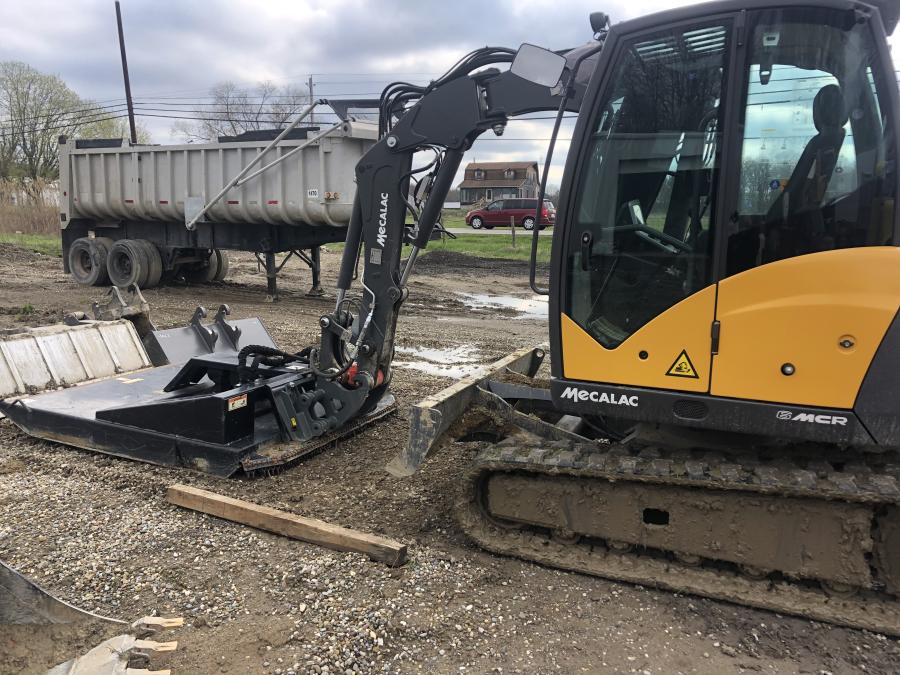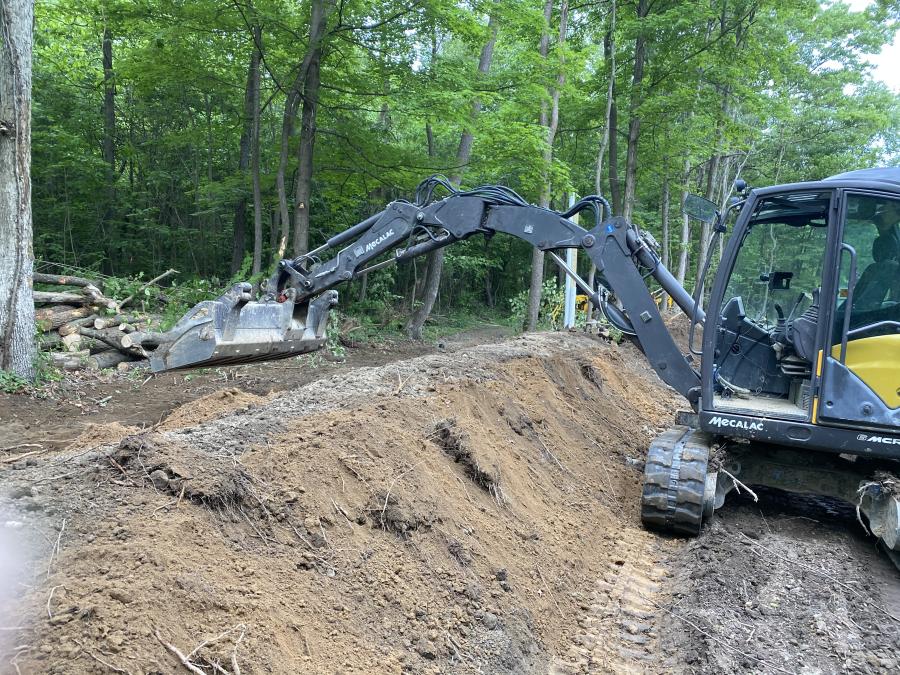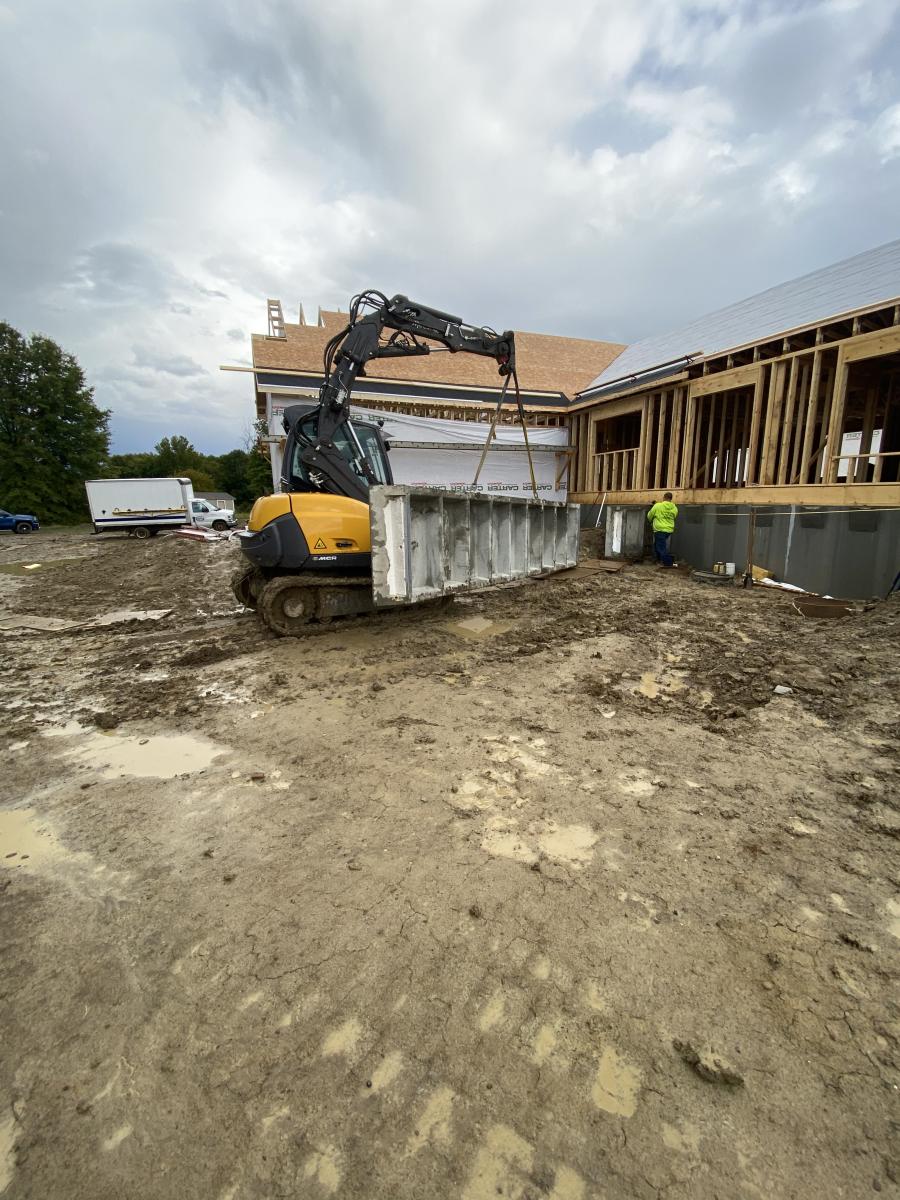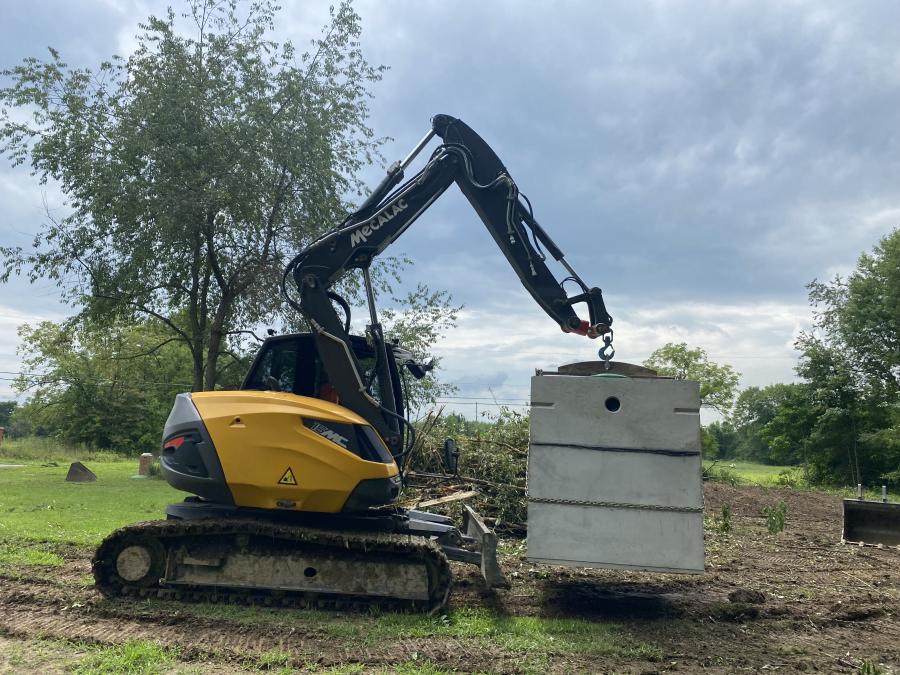The Mecalac MCR series skid steer excavator hybrid with a unique boom configuration can execute projects with attachments that have never before been possible.
(CEG photo)
Technological innovation's main goal is to help people and businesses to do their work more efficiently, more affordably and to generally make their lives easier. A business owner found that out and more three years ago when he attended ConExpo, after a friend gave him a first-class airline ticket and his pass to the show.
Sergeant & Sons Septic and Excavating is a family-owned company that serves the western slope region of Colorado and beyond. The company, which was founded in 2015 by Ron Sergeant in Southington, Ohio, and relocated to the Plateau Valley of Colorado in 2022, specializes in all types of septic work, residential and commercial site work, commercial mulching and concrete work.
Ron Sergeant has had a long and interesting path to where he is today, starting out working for his father's excavation business in northern Michigan until he and his wife, Meghan, decided to leave northern Michigan for a warmer climate, namely Raleigh, N.C., where he expanded his skills in the construction trades and worked his way into the position of superintendent and project manager for a local construction firm.
After a period of time, Sergeant found that the southern climate was a little more hostile than he anticipated, and he and Meghan decided to return home to a newly appreciated Michigan climate.
Sergeant thought that he would be returning home to the family business, but the dynamics there had changed and there really wasn't going to be a place there for him. At that time, there were not a lot of other opportunities in that part of Michigan and Sergeant started a journey of extensive travel working for significant construction companies outside of the Michigan area, while Meghan stayed home and held down the fort.
His first experience was working in Vermont cleaning up after hurricane Irene. From there, he transitioned to working for a construction company in Maine that specialized in putting up cell phone towers all over New England. It was good work, but the cost of living, and in particular housing, was so high, they did not feel comfortable moving the family to the New England market.
At one point, the company sent him to work on a major project in New Jersey and the worst thing that could possibly happen to a guy working thousands of miles from home for a construction company happened — his employer went belly up. Fortunately, they were working as a subcontractor to another major contractor and that contractor liked what they had seen in Sergeant's work and immediately brought him on board to keep the project moving. It was the right pay and the right stability that he was looking for. Sergeant had his family pack up the household and make the move from Michigan to New Jersey, where they stayed for six years.
After six years, the company transferred Sergeant to Ohio in a position that required extensive travel, lots of time away from the family. In 2015, he decided he had enough, and he made a life altering decision — he purchased an excavator, a dump truck and a trailer and started his own construction business.
Through luck and a relationship that he had with a local mortgage broker, Sergeant found out that there was a booming need in the state of Ohio for contractors who had the skills to install properly engineered septic systems. In Ohio, before any house is sold, among other things, there is a test of the septic system. If it fails, which is not uncommon, money is put into an escrow and a fully engineered septic system must be installed immediately after the closing. This pointed the way to Sergeant starting a construction firm that specialized in septic system installations.
From 2016 to 2022, Sergeant & Sons Septic and Excavating installed approximately 400 septic systems. As that business grew, along with its equipment fleet, it started digging basements. In the first three years, the company experienced almost uncontrolled growth.
In 2020, the business was continuing to grow at an amazing rate, but the equipment inventory was becoming burdensome. A tremendous investment had been made in technology, including GPS and tilt rotators for a number of the excavators. The debt load was getting heavier, and Sergeant was not sure that all of it was giving him the return on investment that he was looking for.
According to Sergeant, at about that time, he took the family on one of those "once in a lifetime" vacations.
"We went to the Rockies for Christmas and basically fell in love," he said. "We went skiing, snowmobiling, visited Yellowstone, we had the whole experience. Spent a bunch of money, had a ton of fun, and the whole way home all I could think about was ‘boy. how I loved that place.' That was Christmas. A couple of months later I received a call from a friend of mine whose wife was having a baby and he had tickets to ConExpo and asked if I would like to use them. He said ‘I've got a first-class seat all bought and paid for and an extra ticket. Why don't you go?'"
Sergeant took him up on the offer and headed to Las Vegas for his first visit to ConExpo.
"Just before I left, I sold off one of my newer compact excavators with a tilt rotator, so I was probably in a dangerous position," he said. "I was entering ConExpo having just relieved myself of some debt. As I was walking around the show, I saw these little excavators that were acting like skid steers, but I thought they were excavators and they were sleek and pretty like spaceships and they were doing these amazing demonstrations. You could do just about any job that you wanted to do with these machines.
"As I watched these machines it struck me just how much money I could save with these machines just in trucking along — no longer trucking two machines to a job where I only need one. That also led me to thinking about scaling my business down just a little bit smaller. For me it was welcome to the world of Mecalac."
According to Sergeant, he walked into that show with no intentions of buying anything at all, he was "just looking."
"It was Tuesday when I saw the machines. Wednesday, I just had to go back and look again. When I came back, they were doing more demonstrations and a good size crowd had gathered and I was dumfounded with what I saw. Absolutely randomly as I was standing there, I strike up a conversation with a man with a European accent who turns out to be the owner of Mecalac. I convinced him that if he would let me operate the machine for an hour to see if I can get comfortable on it and if it really does everything that it looks like it does, I will buy that machine Wednesday night."
The man in question was Alexandre Marchetta, president and CEO of Mecalac. Marchetta instructed Sergeant to meet with one of Mecalac's U.S. representatives there at the show, Ryan Carter, who coincidentally was from Sergeant's home state of Michigan.
Carter arranged for Sergeant to come back to the show after hours and test drive the Mecalac 6MCR.
"After about an hour I knew right then and there that this machine, for the majority of the work that I do, was ideally suited to save me a lot of money. Projects were going to get done more efficiently using fewer pieces of equipment.
"I signed the papers purchasing the machine on Wednesday evening. Thursday morning the announcement was made that the show was shutting down early and everybody needs to go home. The world is on edge, no one knows what's going to happen next, and I haven't even told my wife that I bought a new machine, yet. We are under a major travel advisory and can't go anywhere. The machine is sitting in Massachusetts, and I'm supposed to go pick it up. So, my youngest son and I jump in my pickup truck with a trailer, and we head to Massachusetts. Hotels are closed so we are sleeping in the truck. The roads are just about deserted, there is no traffic anywhere."
When the Sergeants returned home, new machine in tow, they learned that, fortunately for them, septic contractors have been deemed an essential business and they will be able to continue operations.
Sergeant put the Mecalac to work and discovered that it is virtually everything that he thought it would be — and more.
"It operated exceedingly well as an excavator. It was more versatile than any skid steer we had ever owned. In fact, I owned two skid steers and it wasn't long before I got rid of them, and I let Mecalac know that we were thrilled with our machine. We were booked out six to eight months and the world had turned upside down. We had some employees decide that they did not want to work anymore under the circumstances. So, it was fortunate that we had a real time-saving machine on our hands because we really needed it."
Where the Mecalac machine was really saving the company was in labor and in travel, Sergeant said.
"I only needed to load one machine to go do a septic job. Traditionally, it had been an excavator and a skid steer, along with an operator for each. Now I am loading one machine and sending one operator to get the same job done. I purchased six or seven attachments for the machine, and we were sending typically two attachments to each site."
With the Mecalac's unique design it turned out to be a great tool for demolition, Sergeant said, adding that he could use a 72-in. brush grapple as a thumb and load 15-ft. tri-axles with the same ease as a mid-sized excavator.
"Typically, with an east coast dump truck, it's too high to load properly to its full capacity with a skid steer. The Mecalac reaches 16 feet with ease and loads these trucks with no problem. So, when we started to do demolition work, we could get a full bucket with a big grapple and load a large truck with ease."
After ConExpo and his trip out west, Sergeant had a hard time getting what he saw and enjoyed in the west out of his system. He went back a couple of more times on hunting trips and really fell in love with the area.
"I had an opportunity to purchase one company, but it was just a little too rich for my blood. But I just kept traveling around parts of the western U.S. trying to figure out a way to move my business out here. The longer I worked in Ohio, the more obsessed I became with leaving it. The excavating conditions compared to other parts of the country are very difficult. In dry conditions you're working with hard to excavate clay. If it's wet at all, it's just sloppy mud, and its sloppy and nasty for about nine months out of the year. The more I worked in it the more obsessed I became with getting out of it. Every time I visited the mountains of the west, the more I fell in love with them. We invested in snowmobiles and ATVs to really enjoy our trips. We were ready to go."
The Sergeant family started a serious house hunting effort, but the timing wasn't the best.
"Right in the middle of COVID was the worst possible timing. Prices were skyrocketing and everything was well over a half a million dollars. Finally, a stroke of luck came our way, and we found a small home under $400,000 near Grand Junction, Colorado, that perfectly fit the lifestyle we were looking for. A nice home on 18 acres, affordable, near wildlife, with accessibility to land where we could use the snowmobiles and ATVs. Without my wife ever seeing it we made the buy and the big move."
Shortly after relocating, a problem developed with a practically new excavator that the company had purchased. The machine was down and due to an unfortunate series of errors, an excavator with only 700 hours on it could not be operated and supply chain issues were keeping it on the sidelines. The machine was equipped with a tilt rotator and a tree shear and was completely out of commission.
"About this time, I recalled a unique machine that Mecalac had on display at ConExpo — their model 15MC crawler excavator. Within our fleet of machines, I have a big 320 size machine and the 160 size machine that was out of commission, which were the only ones big enough to lift a septic tank off the truck and in or out of position. They're big tanks and bulky to work with, weighing 16,000 pounds. The 320 is a huge machine for us, bulky and hard to move, less than ideal for our circumstances.
"I called Ryan at Mecalac, and he told me that the Mecalac 15MC crawler excavator would lift 17,500 pounds. To my way of thinking, that claim defied physics; that's almost half the weight of the machine. I was in a dilemma; I did not want to drive the 320 to every job; the 160 was definitely out of commission, and Mecalac had one of the 15MC crawler excavators left in the U.S. which was sitting in Massachusetts.
"I was very skeptical about the Mecalac 15MC's ability to lift a tank that size, but Mecalac upped the ante and stated that if the machine could not handle the tanks, they would buy the machine back. So, I bought the machine, drove to Massachusetts to pick it up, and sure enough it lifts the tanks with ease.
"Watching the Mecalac lift the tanks is an impressive sight. The tanks are literally as big or bigger than the machine itself. What apparently makes this work is a uniquely designed Mecalac two-piece boom. It literally transfers the weight back over the center of gravity. Beyond that it's hard to explain, its physics. It's a unique engineering design that allows this machine to pick way more than any other machine in the same carrier weight category."
In addition to its lifting power, Sergeant also is impressed with the machine's visibility, which he called "absolutely amazing."
"Somehow Mecalac has fitted the DPF filters and all of this new emission equipment below the line of sight. Their visibility is lightyears ahead of everyone else," he said.
"I thought I was in great shape before, now it's even better. I can go to any job to attack any septic project with literally one load on my new lowboy. Both Mecalac machines fit on a single load and will give me all of the equipment that I need to handle any aspect of any septic project, and just about any excavating or demolition project I get involved in."
No longer needing his 320-size machine, Sergeant sold it and a dedicated trailer that he had for hauling it around, which gave him some positive cashflow and saved him a bunch of money, he said.
"Three weeks later, I finally get the 160-size machine back. Keep in mind, it was an almost new machine that had been out of commission for months, during which time I had made six months' worth of payments on. It's given back to me with a $7,000 repair bill. I am absolutely dumbfounded, and to top it all off, I no longer need the machine because the Mecalac is doing everything the 160 was only better.
"Thank goodness we were in the middle of COVID and the supply chain nightmare, and used machines were selling at a very high premium. I was able to sell the machine on the internet the day I got it back and get out from under it unscathed. With the two Mecalac machines and a trailer my equipment inventory was in the best shape it's ever been in. At that point, fortune was turning our way. Our house back in Ohio sold; I sold off all of our remaining jobs in Ohio to another contractor; and we threw ourselves full focus into our new business."
Sergeant started using social media, namely Facebook, to promote the septic and excavating business and his phone started ringing.
"Once we completed a few jobs, we received some great recommendations on Facebook and the business grew even more. It's been a pleasure doing business here. There is not nearly as much mud. We can get in and get out quickly, no clay issues to deal with. We have easier and closer access to our aggregate, which has saved us substantially in our hauling costs. As a matter of fact, the nearest gravel pit is only three miles from my house. There are two loaders parked in the gravel pit, as well as a scale, and it works on the honor system, and it's open seven days a week. I never dreamed that such a thing could exist.
"With that supply being so close by and with tremendous versatility and accessibility we immediately went into the gravel hauling business. In the first three months, we hauled more gravel than we had hauled in the previous eight years. It's worked so well we just bought another Peterbilt for a total of three."
For more information about Sergeant & Sons Septic and Excavation, visit sergeantseptic.com. CEG
Today's top stories






















